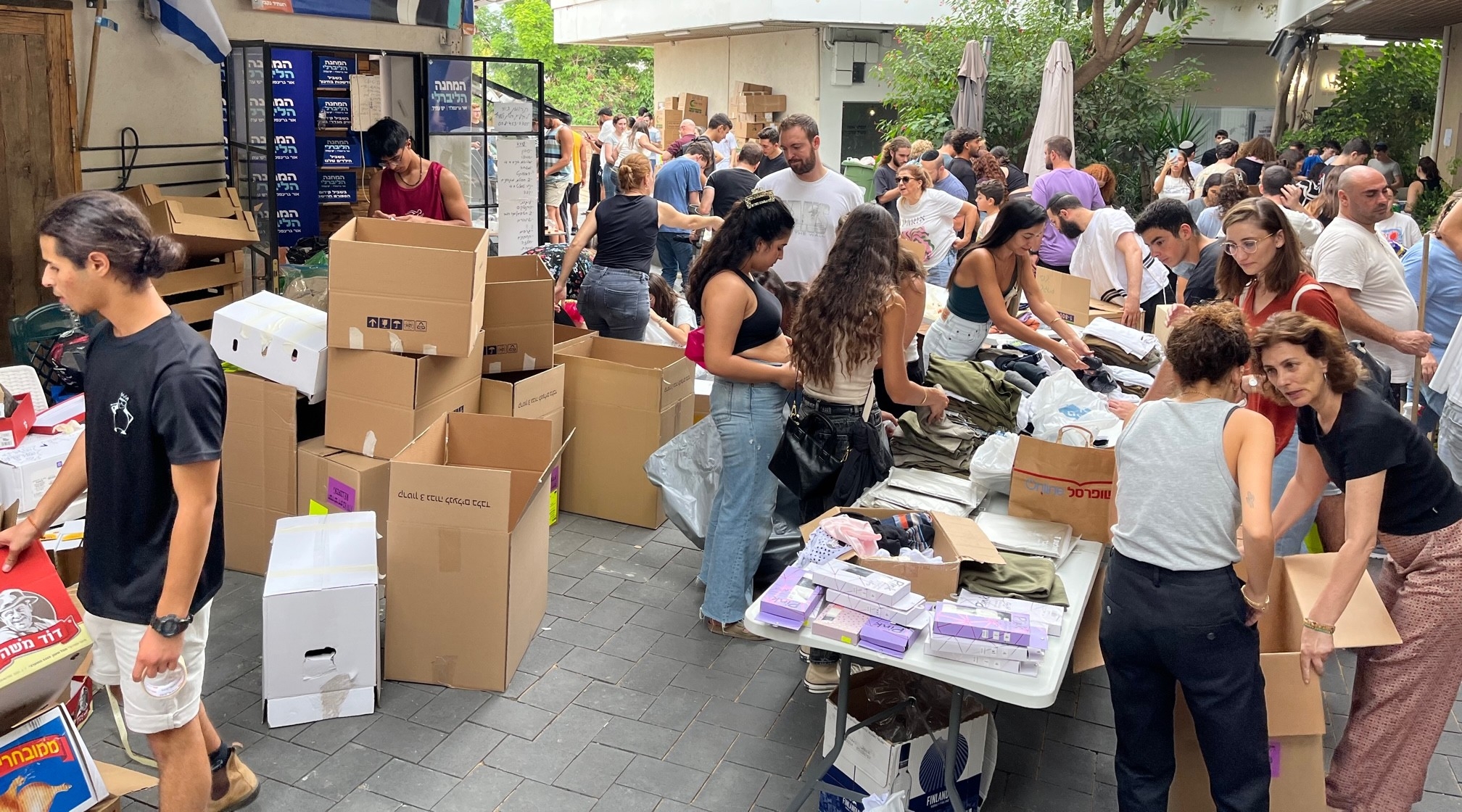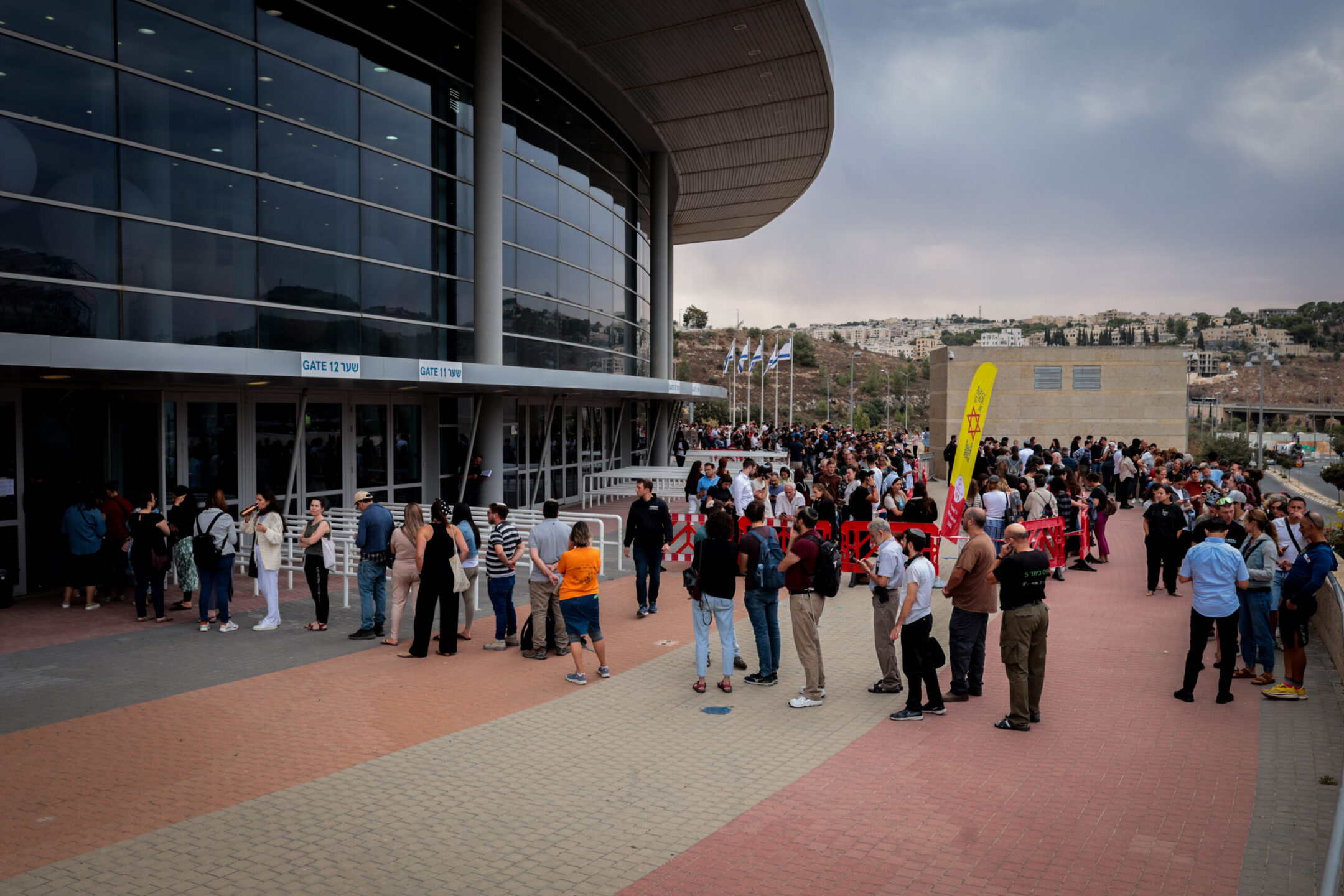With their country under fire, Israelis who can’t fight find other ways to help
A massive volunteer mobilization effort is underway as Israelis seek to help soldiers on the front lines and residents of the South and North displaced from their homes

Volunteers at a shopping center in the Maccabim neighborhood of Modiin, Israel, collecting and packaging supplies for soldiers, including soap, shampoo, deodorant, canned tuna, energy bars, underwear, socks, toothbrushes and female hygiene products, Oct. 9, 2023. (Uriel Heilman)
MODIIN, Israel (JTA) — When Israel’s national emergency service, Magen David Adom, opened a mobile blood donation site in the central Israeli city of Modiin on Tuesday to address the needs of those injured by Hamas’ attacks, the plan was to run a nine-hour emergency blood drive.
But the site was so overwhelmed when over 650 volunteers showed up at the opening that within an hour staffers said they had reached their blood-collecting capacity for the day and urged donors to stop coming.
Not far away, at a shopping center in Maccabim, volunteers collecting supplies for soldiers including soap, shampoo, deodorant, canned tuna, energy bars, underwear, socks, toothbrushes, female hygiene products and toilet paper were bustling with urgency.
Community members dropped off items they’d brought from home or stores, teenagers sorted them, and volunteers loaded them onto trucks and delivered them to soldiers in southern Israel. After a busy Monday, organizers sent out word on Tuesday that volunteers should stop coming to work at the site because there were too many – though they still needed supplies.
Four days after Hamas launched a brutal attack against Israelis with the murders of hundreds of civilians, soldiers and police in areas near the Gaza Strip and heavy rocket bombardments aimed at southern and central Israel, most Israelis appear to be falling into one of two groups: those mobilizing to fight and those trying to support them and the victims.
“I can’t sit and work. I’m a person who feels I need to do something. I can’t watch from the sidelines,” said Assaf Tzur-El, a Modiin resident who collected over $1,000 from friends, work colleagues and members of his synagogue to buy supplies for soldiers. “In this case I’m not doing reserve duty; I can’t for health reasons. There’s not a lot I can do there, so I do what I can.”
His effort began Sunday at the behest of his daughter, Yael Tzur-El, 22, who kicked into gear after reading posts on social media about the soldiers’ needs. She got two local falafel places to donate 80 meals, filled the trunk of her father’s car with food, drinks and salty snacks, and drove to an army gathering point near Rehovot to distribute the food to soldiers waiting to go down south. They handed off the food to security at the gate and within minutes saw soldiers exiting in cars headed southward chomping down on the food they’d brought.

Hundreds of Israelis donate blood in Jerusalem, Oct. 9, 2023. (Noam Revkin Fenton/Flash90)
The Israeli volunteer efforts span the gamut.
Social workers are showing up at the Dead Sea hotels where evacuees of the Israeli kibbutzim and towns that were attacked are recovering. Residents of central Israel are opening up their homes to fellow citizens who have fled affected areas in the South and towns along Israel’s northern border, near Lebanon, that are now considered at risk of terrorist infiltration.
“I want to invite anyone who needs a place to be my guest,” Noga Brenner Samia, a resident of Telmond, a small town not far from Netanya, said in a video she shared on social media. “I know maybe it’s hard to come into a stranger’s home. But I want to say that none of us are strangers. Nobody today is a stranger. We all are friends; we just haven’t met yet. So whoever needs a place to stay, I have a quiet, pleasant house. I’ve got a lot of available rooms because the kids are in the army or national service.”
Israeli chef Eyal Shani prepared a complimentary lunch on Monday at his Tel Aviv restaurant HaSalon for residents of southern Israel who had been evacuated to a hotel in the city, and the restaurant also prepared hundreds of bagged meals to be sent to soldiers. “With much love and hope for better days,” read a note attached to each bag.
“We wanted to do good for the residents of the South,” said Netanel Rosenberg, a chef who works at the restaurant. “Families came, older people – about a hundred in all. It put a smile on their face.”
A group of Hasidic Orthodox Jews from the desert town of Arad, near Masada, surprised soldiers on a nearby military base with a delivery of dozens of pizza pies. Volunteers launched crowdsourced fundraising efforts for large orders of mobile phone batteries and chargers for soldiers stuck on the front lines. Parents with sons and daughters in the army fielded messages from their children about the need for outdoor mattresses, wearable flashlights and sleeping bag covers to keep their bedding dry from rain. A group calling itself Grilling for the IDF spent a day barbecuing and then delivering the food to soldiers.
“We literally just heard from the boys now that the food that we donated yesterday they got now and they’re so, so happy,” said Noa-Chen Anders, a 15-year old from Modiin who, along with her 14-year-old sister, Miya, organized a food delivery on Monday of six cars full of food to soldiers. “They just put it all on the table and many of them ate for the first time since Friday.”
The efforts are not limited to Israelis. American Jews, too, are mobilizing. Donors in Los Angeles organized a van full of bulletproof vests to be delivered to LAX so they could be loaded on an El Al plane and delivered to Israel. (The Israeli Defense Forces says the army has no shortage of protective equipment but that it takes time to get everything in place; however, soldiers on the ground are complaining of substandard or scanty equipment).
Over 300,000 Israeli reservists have been called up for duty so far.
Because of the logistics involved, they don’t all have beds to sleep in or enough satisfying meals or hygiene supplies. In an army where most soldiers go home every couple of weeks or so, most military bases are not equipped with laundry facilities. And many soldiers left home with little more than the clothes on their back on Saturday in their rush to answer the call of duty while Hamas’ attacks were in full force.
This is the need volunteers are trying to address — so much so, in fact, that supermarkets are running low on items in high demand by soldiers because donors are buying them up in large quantities.
Tzur-El said the biggest sacrifice he has made so far was standing in the supermarket checkout line at Rami Levy, a national discount chain, for over an hour and a half. He might have complained, but then he saw a friend in front of him with a cart and a half piled high with items because he had opened up his home to a family displaced by the war and needed more food.
“There are people doing far more than me,” he said.
This article originally appeared on JTA.org.
A message from our Publisher & CEO Rachel Fishman Feddersen

I hope you appreciated this article. Before you go, I’d like to ask you to please support the Forward’s award-winning, nonprofit journalism so that we can be prepared for whatever news 2025 brings.
At a time when other newsrooms are closing or cutting back, the Forward has removed its paywall and invested additional resources to report on the ground from Israel and around the U.S. on the impact of the war, rising antisemitism and polarized discourse.
Readers like you make it all possible. Support our work by becoming a Forward Member and connect with our journalism and your community.
— Rachel Fishman Feddersen, Publisher and CEO

























